Obesity promotes resistance to anti-VEGF therapy in breast cancer by up-regulating IL-6 and potentially FGF-2
- PMID: 29540614
- PMCID: PMC5936748
- DOI: 10.1126/scitranslmed.aag0945
Obesity promotes resistance to anti-VEGF therapy in breast cancer by up-regulating IL-6 and potentially FGF-2
Abstract
Anti-vascular endothelial growth factor (VEGF) therapy has failed to improve survival in patients with breast cancer (BC). Potential mechanisms of resistance to anti-VEGF therapy include the up-regulation of alternative angiogenic and proinflammatory factors. Obesity is associated with hypoxic adipose tissues, including those in the breast, resulting in increased production of some of the aforementioned factors. Hence, we hypothesized that obesity could contribute to anti-VEGF therapy's lack of efficacy. We found that BC patients with obesity harbored increased systemic concentrations of interleukin-6 (IL-6) and/or fibroblast growth factor 2 (FGF-2), and their tumor vasculature was less sensitive to anti-VEGF treatment. Mouse models revealed that obesity impairs the effects of anti-VEGF on angiogenesis, tumor growth, and metastasis. In one murine BC model, obesity was associated with increased IL-6 production from adipocytes and myeloid cells within tumors. IL-6 blockade abrogated the obesity-induced resistance to anti-VEGF therapy in primary and metastatic sites by directly affecting tumor cell proliferation, normalizing tumor vasculature, alleviating hypoxia, and reducing immunosuppression. Similarly, in a second mouse model, where obesity was associated with increased FGF-2, normalization of FGF-2 expression by metformin or specific FGF receptor inhibition decreased vessel density and restored tumor sensitivity to anti-VEGF therapy in obese mice. Collectively, our data indicate that obesity fuels BC resistance to anti-VEGF therapy via the production of inflammatory and angiogenic factors.
Copyright © 2018 The Authors, some rights reserved; exclusive licensee American Association for the Advancement of Science. No claim to original U.S. Government Works.
Conflict of interest statement
Figures
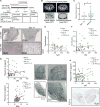
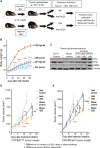

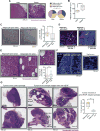

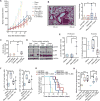
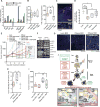
Comment in
-
Breast cancer: Obesity - tipping the scales of resistance.Nat Rev Cancer. 2018 May;18(5):265. doi: 10.1038/nrc.2018.31. Epub 2018 Apr 6. Nat Rev Cancer. 2018. PMID: 29610490 No abstract available.
-
Obesity associated with resistance to anti-angiogenic therapy.Nat Rev Clin Oncol. 2018 Jun;15(6):344. doi: 10.1038/s41571-018-0011-5. Nat Rev Clin Oncol. 2018. PMID: 29626201 No abstract available.
-
Anti-VEGF therapy - a role in obesity-related breast cancer.Nat Rev Endocrinol. 2018 Jun;14(6):329-330. doi: 10.1038/s41574-018-0021-5. Nat Rev Endocrinol. 2018. PMID: 29695750 Free PMC article.
-
Obesity Protects Cancer from Drugs Targeting Blood Vessels.Cell Metab. 2018 Jun 5;27(6):1163-1165. doi: 10.1016/j.cmet.2018.05.014. Cell Metab. 2018. PMID: 29874563
References
-
- Lohmann AE, Chia S. Patients with metastatic breast cancer using bevacizumab as a treatment: Is there still a role for it? Curr Treat Options Oncol. 2012;13:249–262. - PubMed
-
- Guiu B, Petit JM, Bonnetain F, Ladoire S, Guiu S, Cercueil JP, Krausé D, Hillon P, Borg C, Chauffert B, Ghiringhelli F. Visceral fat area is an independent predictive biomarker of outcome after first-line bevacizumab-based treatment in metastatic colorectal cancer. Gut. 2010;59:341–347. - PubMed
-
- Ladoire S, Bonnetain F, Gauthier M, Zanetta S, Petit JM, Guiu S, Kermarrec I, Mourey E, Michel F, Krause D, Hillon P, Cormier L, Ghiringhelli F, Guiu B. Visceral fat area as a new independent predictive factor of survival in patients with metastatic renal cell carcinoma treated with antiangiogenic agents. Oncologist. 2011;16:71–81. - PMC - PubMed
Publication types
MeSH terms
Substances
Grants and funding
LinkOut - more resources
Full Text Sources
Other Literature Sources
Medical

